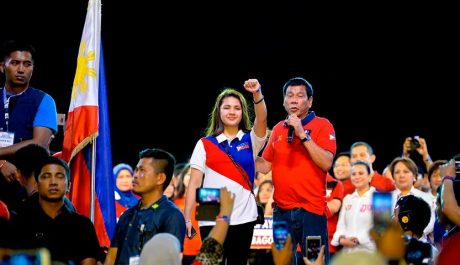
One thing’s for sure, the Philippines’ elite Establishment is unnerved by the show of power that was leading presidential candidate Rodrigo Duterte’s insanely successful miting de avance held Saturday, 7th May 2016 at the Luneta. More than anything else, it was renewed Filipino nationalism on display, with the red-white-and-blue colours dominating above any semblance of partisanism if any at all. If this was Filipino nationalism re-discovered on such a scale not seen since Independence Day in 1946, it says something about the nature of the fear struck into the hearts of the Philippines’ entrenched oligarchy and the self-appointed members of its so-called “civil society”.
Duterte’s ascent to power highlights the confronting reality that the 1986 EDSA “revolution” was never a true revolution in the real sense of the word. Now that the hot air in the perception that the “holy sacrifice” of the Aquino-Cojuangco clan owned the only “fight” worth fighting by the Filipino had finally been sucked out of the Yellow bubble, it is plain as day today that there really was nothing revolutionary about Cory Aquino’s “democracy”. All it did was oversee a musical chair of oligarchs, all the while keeping the pie being divvied amongst them out of the reach of most ordinary Filipinos.
The Second Aquino Presidency led by Cory’s only son, President Benigno Simeon ‘BS’ Aquino III promised, back in 2010, that all that will change under his watch — that the roadblock to inclusive prosperity would be removed. Under Aquino’s daang matuwid (straight path) mantra, came the promise that the elimination of that singular roadblock to inclusive prosperity, corruption (we were told), would be implemented. Thus, the Son of Cory, put forth yet another myth — that this walking down the “straight path” and the smiting of “corruption” to pave the way for universal prosperity was the revolution his administration would oversee.
That myth has since been busted. It took just six years for Filipinos to discover the abject hollowness of BS Aquino’s Daang Matuwid. With that disillusionment over yet another set of lofty promises being broken came the creeping in of feelings of revulsion towards Aquino’s colours — his yellow banners and the emorhetoric surrounding them. It is much like how a former lover’s sweet nothings make one’s skin crawl when one recalls the memory of these words being whispered in one’s ear.
The key takeaway from Saturday’s Duterte Grand Rally lies in the words of his former professor Jose David Lapuz who recalled how Duterte learned at San Beda Law School, “Ang batas ay may lakas.” (“the law has strength”) but that nowadays, “ang tingin natin sa batas ay may butas” (“we see the law as full of loopholes”). He then asserts that rather than focusing on finding loopholes in the Law as many politicians do today…
Kay Duterte, hahanapin niya ang lakas ng batas and strongly, forcefully, vigorously, [enforce the law], subalit, siya ang kumakatawan sa pantay-pantay na pagtangkilik ng batas. Mayaman, mahirap, guwapo, hindi guwapo — pantay-pantay na pagtangkilik. Iisa ang Pilipino nation.
[Translated: Duterte will draw upon the full strength of the law and strongly, forcefully, vigorously enforce it and embody its consistent equal applcation to all whether rich, poor, good looking or not so good looking. All will be equal in the application of the law as the Filipino nation is one nation in its eyes.]
Thus the challenge to Filipinos in their choice of Rodrigo Duterte as 16th President of the Republic of the Philippines is to hold him to his former teacher’s words. Duterte has demonstrated that he wields the awesome political capital needed to effect the change his supporters maintain “is coming”. As a leader, he will be judged on the basis of that promise. As his people, Filipinos are duty-bound to ensure he fulfils that promise within the framework of the law that Lapuz asserts will be the source of the strength of the Duterte administration. On the ability to fulfil that duty as citizens of a democracy, all Filipinos will be judged.
This is the pact between leadership and citizenship in a true democracy. How the Philippines upholds its democracy and, at the same time, draws upon the evident strength of Duterte’s leadership and mandate will define the quality of the much-anticipated revolutionary change at hand that was denied the Filipino back in 1986.
The fear being fomented by Duterte’s detractors that his will be an authoritarian vigilante government is a cop-out from the citizen’s duty to her democratic country. Rather than succumb to that fear, Filipinos owe it to themselves to embrace this fear, overcome it, and step up to their duty to the Republic and get the best out of their next president, Rodrigo Duterte.

No comments:
Post a Comment